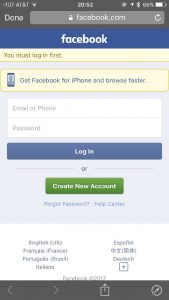It's been about a year since I left Facebook, and I'm still glad I did. (I guess there were those thirty years before Facebook existed that I somehow managed without it, too.)
Some observations:
People in my circles generally continue to assume that I've seen their event invitations and life updates on Facebook, and so it's still a regular occurrence that I find out about something well after everyone else, or not at all. This is most annoying when it's something really time sensitive that I would have liked to have been a part of.
Some of my published writings have been shared extensively on Facebook, generating hundreds or even thousands of views on my various websites, but I don't have a way of knowing where that activity is coming from or what kind of conversation it might be generating there. I've had people tell me in person that they saw and liked something via Facebook, which is nice, but of course I wish they'd leave their likes and comments on my site where it's closer to the original writing, visible to the world, and not subject to later deletion by some corporate entity. (This comes up for any social network, not just Facebook, but it tends to be the one generating the most traffic for me.)
 I won't make a claim that the hours I've saved by not looking at Facebook have freed me up to accomplish some amazing other thing. I will say that I felt a nice release from the self-created pressure to keep up with my interactions and profile there, and that in turn has contributed to an increase in my overall creative energy for other things.
I won't make a claim that the hours I've saved by not looking at Facebook have freed me up to accomplish some amazing other thing. I will say that I felt a nice release from the self-created pressure to keep up with my interactions and profile there, and that in turn has contributed to an increase in my overall creative energy for other things.
I had one time where I needed to use the Facebook sharing debugger for a work project. I signed up for a new account to do this, but Facebook clearly found my lack of interest in populating a real-looking profile to be suspicious, and closed down the account soon after. In the end it was faster to ask a colleague with an active account to do the debugging for me and share the results. As I've said before, I think it's ridiculous and irresponsible that Facebook doesn't make that tool available to logged-out users.
I'm still surprised at how many organizations and businesses use Facebook as their one and only place for posting content; some even do it in a way that I just can't see it as a logged-out user, and others don't seem to realize that they're giving Facebook 80% of any screen real estate on the links I can see. I am now much more likely to avoid doing business with or offering my support to these entities if they don't bother offering non-Facebook ways for me to engage.
I've accepted that people will not necessarily seek out the open version of the web on their own. Being off Facebook has reinforced that there are big gaps to close in the user experiences that other tools and services offer (the WordPress/blogging ecosystem not least among them). My own efforts to migrate my content that still exists on other services like Flickr into a digital home that I fully control are slow-going, so I don't expect other people to even bother. Facebook is still the path of least resistance for now.
When the actions of Cambridge Analytica were in the news, it was tempting to feel smug about not being an active Facebook user. But I know they still have tons of information about me that is of value to advertisers and others, and that even as I use browser plugins to try to prevent Facebook from accumulating an even larger profile of my online activity, it is a losing battle until there are larger shifts in the culture and business models of technology companies.

